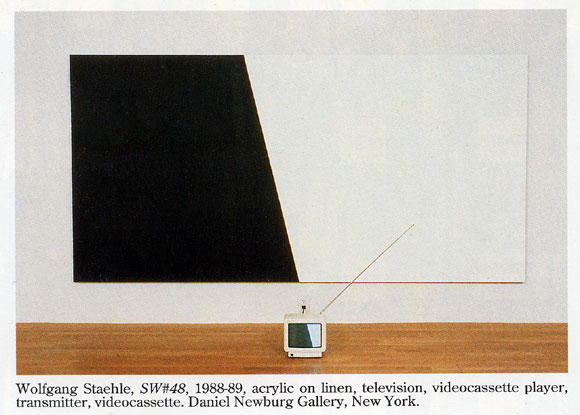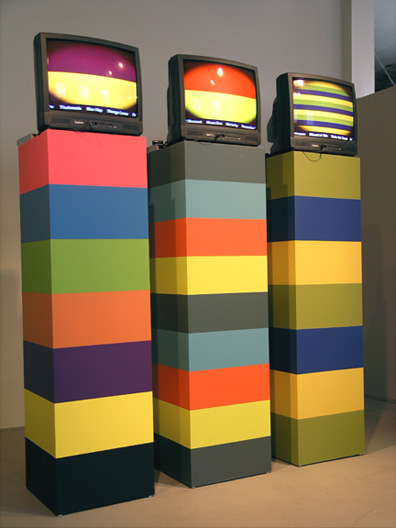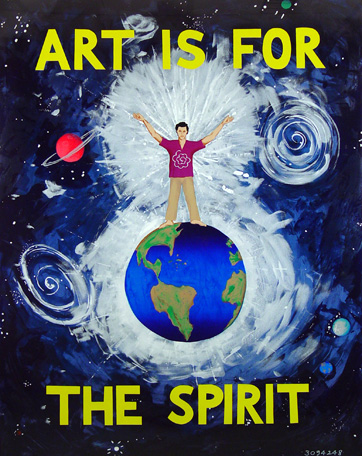Televised Abstraction, 1988-2007


Lorna Mills, L to R: Bletchingly, Infomint, Lucky Hubble 2007, MFD, latex, video (at akau inc., Toronto)
Mills' piece (see this Digital Media Tree page, where we are fortunate to have her posting as L.M.) differs from the Staehle in the choice of "formalist forms" used, a sense of heightened artificiality, the oval masking on the screen, and most significantly the real world content: names of racehorses scrolling across the bottoms of her screens, defamiliarized and exoticized in this context. Also, not sure why Staehle was "broadcasting" to his TV--maybe VCRs on the floor were not the norm in 1988.
Thanks Tom.
That Staehle is gorgeous. The scale of the monitor to the painting is really nice. I've used the word "broadcast" in artist statements as an endearment, obviously he's literal. I wonder if he wanted to avoid extra hardware in the installation (and he did use that antenna to great advantage)
Your new pieces look good. I had scanned that Staehle when I first saw your work and forgot to do anything with it. Your post today reminded me. It's an interesting trend, if two artists can be a trend, and suggests ways out of the "minus space rut," if it is a rut--the acknowledgement that certain art languages can be translated into other languages and the conversation continued beyond the physical media where they originated.
In 1998 I organized an "Op Art" show that tried to make this point, using very humble materials. I included TVs by Ray Rapp with bubble animations similar to the printed bubbles I was making at the time as well as other work that made connections to science fair kitsch, buckyballs, craft, etc.
The cover story of this month's Artforum concerns a show in the Midwest US called Optic Nerve, which makes a few nods to current artists but is basically just a rehash and continuing attempt to validate historical Op. That was not the intent with my show--it was more how to "do Op" when art and the culture had "moved on" about 30 times already.
The [your] 'op art' show looks amazingly fresh to this day, and LM has an amazing sense, I love it, and enjoy her posts! You are a player Tom [that's why I head through here more often than not, so why not let others be their player too, and not get into the antiquated and the new as a signpost that must or needs to be passed. I think that's fair enough. Hang on, let be backtrack, um, aren't media wars redundant. I mean what is at stake, oil, readership, skull & cross?
cheers again,
i think Wolfie should have achieved the effect with the tv's vertical and horizontal controls and blown off the vc tape.
Re: "Wolfie" (ouch), as long as I'm citing old articles here's one about using sound to make fairly rigorous TV abstraction.
Anon--if you see boundaries being drawn here such as Reductive Art Only then sorry.
I like the work. Where should I go to pick up the license to like it with a license? How tedious!
Whoops, I forgot:

Thanks for the reminder.
Writing comparatively about work, or referencing an older piece to talk about a newer work doesn't suggest to me the slightest insult or proscription to the artist or the viewer. I do it to other artists all the time. (actually, I heckle people's art when I'm in their studios too. It's really amazing that I have any friends.)
What I'm saying is that it's a part of the big conversation.
Ha, ha, ah, imagination... I always equate spirituality with some kind of longing, a wishing away from a place where one finds themselves. I know others consider it quite the opposite, as a drawing towards some greater [?], a great truth, or whatever, I wouldn't know really because I used the word 'like' in response to a work that appears to have things going on that I like or am interested in -- space capsules, color, transference, reconfiguration, playfulness, time complexities or the race to the end, which might be all the wrong reasons for liking the piece but that's just it, 'when is it wrong to like something for the reasons you do so?'. here's a mad-hatter's tea party... so i'll be off. Before that, though and i think HD said it best...
“When I use a word," Humpty Dumpty said in rather a scornful tone, "it means just what I choose it to mean - neither more nor less.”
cheers
Brent, you can write clearly--not sure if this kind of mystical art mumbo jumbo is helpful to anyone. A comparison between two artists is on the table. We're not talking about what it means to like art.
Hi Tom, communication is a weird thing!
|
Televised Abstraction, 1988-2007
Lorna Mills, L to R: Bletchingly, Infomint, Lucky Hubble 2007, MFD, latex, video (at akau inc., Toronto)
Mills' piece (see this Digital Media Tree page, where we are fortunate to have her posting as L.M.) differs from the Staehle in the choice of "formalist forms" used, a sense of heightened artificiality, the oval masking on the screen, and most significantly the real world content: names of racehorses scrolling across the bottoms of her screens, defamiliarized and exoticized in this context. Also, not sure why Staehle was "broadcasting" to his TV--maybe VCRs on the floor were not the norm in 1988.
- tom moody 5-11-2007 7:57 am
Thanks Tom.
That Staehle is gorgeous. The scale of the monitor to the painting is really nice. I've used the word "broadcast" in artist statements as an endearment, obviously he's literal. I wonder if he wanted to avoid extra hardware in the installation (and he did use that antenna to great advantage)
- L.M. 5-11-2007 8:20 am
Your new pieces look good. I had scanned that Staehle when I first saw your work and forgot to do anything with it. Your post today reminded me. It's an interesting trend, if two artists can be a trend, and suggests ways out of the "minus space rut," if it is a rut--the acknowledgement that certain art languages can be translated into other languages and the conversation continued beyond the physical media where they originated.
In 1998 I organized an "Op Art" show that tried to make this point, using very humble materials. I included TVs by Ray Rapp with bubble animations similar to the printed bubbles I was making at the time as well as other work that made connections to science fair kitsch, buckyballs, craft, etc.
The cover story of this month's Artforum concerns a show in the Midwest US called Optic Nerve, which makes a few nods to current artists but is basically just a rehash and continuing attempt to validate historical Op. That was not the intent with my show--it was more how to "do Op" when art and the culture had "moved on" about 30 times already.
- tom moody 5-11-2007 8:38 am
The [your] 'op art' show looks amazingly fresh to this day, and LM has an amazing sense, I love it, and enjoy her posts! You are a player Tom [that's why I head through here more often than not, so why not let others be their player too, and not get into the antiquated and the new as a signpost that must or needs to be passed. I think that's fair enough. Hang on, let be backtrack, um, aren't media wars redundant. I mean what is at stake, oil, readership, skull & cross?
cheers again,
- anonymous (guest) 5-11-2007 3:09 pm
i think Wolfie should have achieved the effect with the tv's vertical and horizontal controls and blown off the vc tape.
- bill 5-11-2007 3:49 pm
Re: "Wolfie" (ouch), as long as I'm citing old articles here's one about using sound to make fairly rigorous TV abstraction.
Anon--if you see boundaries being drawn here such as Reductive Art Only then sorry.
- tom moody 5-11-2007 7:36 pm
I like the work. Where should I go to pick up the license to like it with a license? How tedious!
- anonymous (guest) 5-12-2007 4:01 pm
Whoops, I forgot:

Thanks for the reminder.
- tom moody 5-12-2007 5:32 pm
Writing comparatively about work, or referencing an older piece to talk about a newer work doesn't suggest to me the slightest insult or proscription to the artist or the viewer. I do it to other artists all the time. (actually, I heckle people's art when I'm in their studios too. It's really amazing that I have any friends.)
What I'm saying is that it's a part of the big conversation.
- L.M. 5-12-2007 8:19 pm
Ha, ha, ah, imagination... I always equate spirituality with some kind of longing, a wishing away from a place where one finds themselves. I know others consider it quite the opposite, as a drawing towards some greater [?], a great truth, or whatever, I wouldn't know really because I used the word 'like' in response to a work that appears to have things going on that I like or am interested in -- space capsules, color, transference, reconfiguration, playfulness, time complexities or the race to the end, which might be all the wrong reasons for liking the piece but that's just it, 'when is it wrong to like something for the reasons you do so?'. here's a mad-hatter's tea party... so i'll be off. Before that, though and i think HD said it best...
“When I use a word," Humpty Dumpty said in rather a scornful tone, "it means just what I choose it to mean - neither more nor less.”
cheers
- anonymous (guest) 5-13-2007 3:11 am
Brent, you can write clearly--not sure if this kind of mystical art mumbo jumbo is helpful to anyone. A comparison between two artists is on the table. We're not talking about what it means to like art.
- tom moody 5-14-2007 5:08 pm
Hi Tom, communication is a weird thing!
- brent (guest) 5-18-2007 5:33 pm